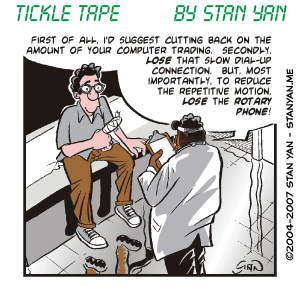If you want to be a winning trader, you must be optimistic, and truly believe that you can win if you set your mind to it. Trading is a tough business. You have to make trade after trade, and many times, take loss after loss before you take home profits across a series of trades. It is vital to remember, however, that what matters, in the end, is the big picture, the profits you make across a series of trades.
That is often easier said than done. There are those times when you desperately want to win on a particular trade or on a particular day, and it just doesn’t happen. It’s difficult to avoid falling prey to disappointment and despair. But when you start feeling disappointed and pessimistic, it is essential that you “repair” your mood, and cultivate a winning mindset. A recent study by psychologists Jutta Joormann and Matthias Siemer offer ways you can do it.
Drs. Joorman and Siemer studied different ways that people can recover from a pessimistic mood. Our moods and memories often go hand and hand. When a person feels discouraged, it’s likely that he or she will conjure up memories of failure rather than success. For example, when you make a series of losing trades, you may tend to start feeling down. You may start to think, “I’m not as good as I thought I was.” At that point, you may start thinking of every losing trade you’ve made in the past while forgetting about all the times you have won. Our minds are “wired” that way. Our moods often dictate the memories that enter our consciousness.
When we are in a bad mood, we remember losing trades. There are a few ways to handle a bad mood. Sometimes it’s useful to just try to think about something else, but this doesn’t always work. Innerworth advisory board member Dr Ari Kiev, for example, suggests allowing a discouraging thought to enter one’s consciousness briefly. Once you acknowledge the unpleasant idea, it will simply dissipate. Trying to ignore or push an unpleasant thought out of consciousness often takes more psychological resources than just acknowledging, “I’ve made a few bad trades. So what. I’m just going to move on.” Sometimes this works, sometimes it doesn’t.
Another suggestion we’ve made at Innerworth is to make a list of your winning trades and to read it when you get discouraged. By reading over a list of triumphs, you’ll buck yourself up and start to feel better. Although these methods can be effective, they don’t always work.
In their study, Drs. Joorman and Siemer asked people in a depressed mood to either distract themselves or to write down pleasant events that happened to them in the past. In the distraction task, people tried to ignore their depressed mood by trying to imagine doing something else, such as walking through a shopping mall and browsing the merchandise in the store windows. When people are not depressed, either strategy produces an improvement in mood.
For people who are especially distressed, however, recalling pleasant experiences doesn’t seem to help much. What seems to work better is to try to distract yourself by thinking about engaging in a pleasant activity, such as shopping or having a good time. This study shows that once you become especially disappointed, it is hard to recover. You might have to forget about what you are doing at the moment, and think about some other more pleasant activity that you could be doing. At the early stages of an unpleasant mood, however, you have more options. You can try to remember more pleasant events from your past or merely tell yourself that everything is going to turn out fine in the long run.
Monitoring your mood is vital. When you are especially discouraged, you may make trading errors. The more you can stay upbeat, yet calm and relaxed, the more you can focus on executing trades flawlessly. And in the long run, you’ll achieve lasting success.


